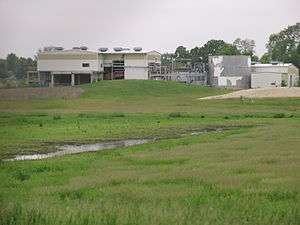Rare Earths Facility

The Rare Earths Facility was a production plant for various chemicals and metals including thorium, uranium, and radium. It was located in West Chicago, Illinois, USA.[1][2][3][4][5][6][7][8][9][10]
History
The site was opened in 1931 by the Lindsay Light and Chemical Company It processed ores like monazite to produce elements, including thorium and uranium. It also made gaslight mantlesand during World War II it made hydrofluoric acid.[11]
In 1958, it became owned by American Potash and Chemical Company (AMPOT),[11] which at one point had a 'Lindsay Chemical Division'.[4]
In 1967, AMPOT, and thus the facility, were bought by Kerr-McGee.
In around 1970, Kerr-McGee reorganized and AMPOT became the Kerr-McGee Chemical Corporation (KMCC). The Rare Earths Facility was closed by Kerr-McGee in 1973.
In 2005, KMCC was spun off from Kerr-McGee as Tronox, shortly before Kerr-McGee was bought by Anadarko Petroleum Corporation. Tronox inherited responsibility for the Rare Earths Facility and other sites. Tronox went bankrupt in 2009 and shareholders sued Anadarko Petroleum, partly for having misled investors in Tronox about its environmental debts.[11][5][6][7][10]
Pollution
In the early years, people from the surrounding community used the mill tailings as fill dirt in various properties, such as their yards and gardens. A woman who played in such a yard as a child later sued Kerr-McGee over her Hodgkin's disease and settled out of court in 1988.[12]
Radioactive waste from the plant was put in a local landfill that later became a public park called Reed-Keppler Park.[2]
Kress Creek and West Branch Dupage River (including sediments, banks, and floodplains) were contaminated by years of rainwater runoff from REF going into a storm sewer and then into the creek.[3] The floodplain includes people's yards.[12]
The West Chicago Sewage Treatment Plant was contaminated when mill tailings from REF were used as fill dirt there. This also resulted in pollution of the West Branch Dupage River from runoff and erosion.[3]
In 1991, the Illinois Department of Public Health found elevated cancer rates in the community.[12]
See also
References
- ↑ U.S. Environmental Protection Agency (July 2009). "NPL Fact Sheet, KERR-MCGEE (SEWAGE TREATMENT PLANT)". Retrieved 2009-10-02.
- 1 2 "Superfund Site Report: KERR-MCGEE (REED-KEPPLER PARK)". scorecard.org. Retrieved 2009-10-02. (based partly on US EPA NPL narrative)
- 1 2 3 "Kerr-McGee & Kress Creek Ecological Risk Assessment". U.S. Environmental Protection Agency. Retrieved 2009-10-02.
- 1 2 "NRC Terminated License Tracking System". US NRC. Searchable by license number 12-04932-01 on https://nrctracking.ornl.gov/tlts/
- 1 2 "American Potash & Chemical Corporation List of Deals". Harvard Business School Baker Library, Lehman Brothers Collection. Retrieved 2009-10-06.
- 1 2 Al Greenwood (May 2009). "Anadarko denies role in bankrupt Tronox fraud lawsuit". ICIS / Reed Business Information Ltd. Retrieved 2009-10-06.
- 1 2 "Shareholder Class Action Filed on Behalf of Purchasers of Tronox, Inc. by the Law Firm of Barroway Topaz Kessler Meltzer & Check, LLP". PRNewswire / Reuters. 2009. Retrieved 2009-10-06.
- ↑ "PACIFIC ENGINEERING & PRODUCTION COMPANY OF NEVADA, Plaintiff-Appellee, v. KERR-McGEE CORPORATION". atlaw / US 10th Circuit. 1977. Retrieved 2009-10-06. 551 F.2d 790
- ↑ "Tronox FAQ". Tronox. Retrieved 2009-10-06.
- 1 2 "FOLLOW-UP REVIEW OF ILLINOIS AGREEMENT STATE PROGRAM" (PDF). US NRC. 2006. Retrieved 2009-10-06.
- 1 2 3 U.S. Environmental Protection Agency (February 1990). "NPL Site Narrative for Kerr-McGee (Residential Areas)". Retrieved 2009-10-02.
- 1 2 3 Starks, Tamara (1993-03-21). "Death in the Sandbox - West Chicago, Ill., Neighborhood Quakes Over Radioactive Soil". Associated Press / Los Angeles Times. Retrieved 2009-10-02.
Coordinates: 41°52′23″N 88°12′30″W / 41.87316°N 88.20824°W